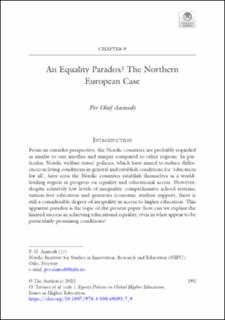An Equality Paradox? The Northern European Case
Chapter
Published version
Permanent lenke
https://hdl.handle.net/11250/3028920Utgivelsesdato
2022Metadata
Vis full innførselSamlinger
Originalversjon
10.1007/978-3-030-69691-7Sammendrag
The Nordic countries are often regarded as unique, with relatively small income differences and welfare state policies characterised by universal and generous public support to its citizens. Educational policies aim at offering schooling for all, with a predominantly public comprehensive school system free of tuition. Based on a broad review of research contributions, this paper aims at investigating whether access to higher education in the Nordic countries are also more equitable than in most other countries.
Research on inequality in higher education has adapted a broad range of data, methodology and theoretical approaches, and it is difficult to draw exact conclusions. Nevertheless, the Nordic countries are among the group of countries showing a positive development towards equality. At the other hand, the enrolment pattern is still socially biased in spite of a massive growth in higher education participation. Furthermore, recent comparative research has shown substantial differences between the Nordic countries in both level and trends in participation.
While access to higher education in general has become more equal in the Nordic countries, enrolment to the most prestigious study programmes is still strongly socially selective, giving support to the Effectively Maintained Inequality theory.
